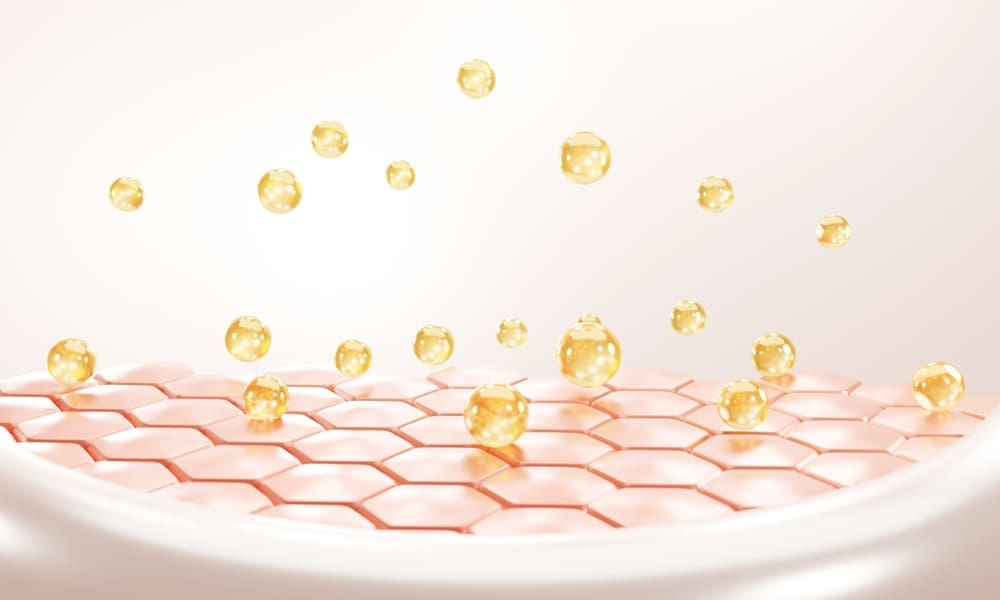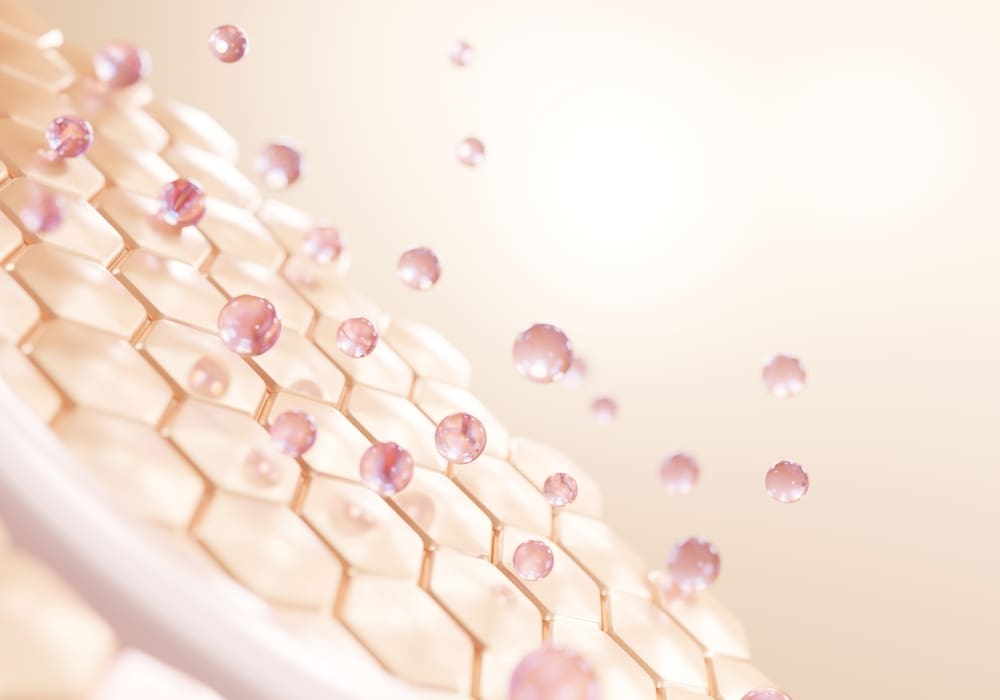Stem cells are the body’s raw materials. They can turn into different cell types to fix and grow tissues. Some vitamins help these cells work better. A lack of vitamins can slow down stem cell activity, affecting our health.

The link between vitamins and stem cell health is complex. It involves many nutrients that help our body fix itself. Vitamins like Vitamin D and Vitamin C are good for stem cells. Knowing which vitamins boost stem cells helps us take care of our health.
Key Takeaways
- Certain vitamins support stem cell health and production.
- A deficiency in vitamins can impact stem cell activity.
- Vitamins like Vitamin D and Vitamin C are beneficial for stem cell function.
- Nutritional elements play a critical role in the body’s natural repair mechanisms.
- Understanding the right vitamins can help individuals support their stem cell health.
Understanding Stem Cells and Their Function in the Body
Stem cells are at the heart of our health and healing. They act as the body’s repair team. These undifferentiated cells can turn into many types of cells, like muscle, bone, and nerve cells.
What Are Stem Cells?
Stem cells can grow and change into different cell types. This makes them key for regeneration and repair in our bodies. Studies show they play a big role in keeping us healthy and help heal tissues.
“Stem cells are vital for the body’s growth, development, and upkeep,” say experts in regenerative medicine.

Types of Stem Cells in the Human Body
There are many types of stem cells in us, each with its own job:
- Embryonic Stem Cells: These come from embryos and can become any cell type.
- Adult Stem Cells: In adult tissues, these cells can repair but are more limited in what they can become.
- Induced Pluripotent Stem Cells (iPSCs): These are adult cells that can be changed to become many cell types, like embryonic stem cells.
How Stem Cells Support Health and Healing
Stem cells help by replacing old or damaged cells. This keeps our tissues healthy. Eating right and exercising can boost stem cell work, showing the value of a healthy lifestyle.
Some foods and vitamins can also help stem cells do their job better. Knowing how to support stem cells through diet and lifestyle is key to staying healthy.
The Connection Between Vitamins and Stem Cell Production
It’s key to know how vitamins impact stem cell work for better health. Stem cells are the body’s building blocks. They can turn into different cell types to fix or replace damaged tissues. Vitamins play a big role in how these cells work.
How Nutrients Influence Stem Cell Activity
Nutrients are vital for stem cell health. Vitamins like vitamin D and C greatly affect stem cell production and work. Vitamin D, for example, helps control genes that let stem cells grow and change.
Key Nutrients for Stem Cell Health:
- Vitamin D: Essential for stem cell differentiation and proliferation
- Vitamin C: Important for collagen synthesis and stem cell generation
- Antioxidants: Protect stem cells from oxidative stress
The Role of Antioxidants in Stem Cell Protection
Antioxidants are key in keeping stem cells safe from damage. Damage from oxidative stress can stop stem cells from working right. Vitamins C and E are strong antioxidants that fight this stress.
“Antioxidants play a vital role in maintaining the balance between the production of reactive oxygen species (ROS) and the ability of cells to counteract their harmful effects.” –
Source: Journal of Stem Cell Research
Cellular Signaling and Vitamin Pathways
Vitamins affect stem cell work through different pathways. For example, vitamin D receptors in stem cells can start signals that help them grow and change.
| Vitamin | Role in Stem Cell Health | Mechanism of Action |
| Vitamin D | Regulates stem cell differentiation and proliferation | Binds to vitamin D receptors, triggering signaling cascades |
| Vitamin C | Supports stem cell generation and collagen synthesis | Acts as a co-factor for enzymes involved in collagen synthesis |
| Vitamin E | Protects stem cells from oxidative stress | Scavenges free radicals, reducing oxidative damage |
The link between vitamins and stem cell production shows why eating well is important. Knowing how vitamins help stem cells can help us make better choices for our health.
Vitamin D: A Key Player in Stem Cell Regulation
Vitamin D is key in controlling stem cell growth. Studies show it’s important for keeping stem cells healthy. This is vital for our overall health and healing.
Research on Vitamin D and Stem Cell Proliferation
Vitamin D receptors are found in many stem cells. This shows it plays a role in their control. Not having enough vitamin D can lower stem cell activity. This can harm our health and raise disease risks.
A study in the Journal of Biological Chemistry found vitamin D helps stem cells turn into specific cells. This boosts our body’s repair abilities. So, it’s key to keep vitamin D levels up for good stem cell function.
“Vitamin D is not just vital for bone health; it also controls stem cell activity. This is key for fixing and growing tissues.”
Optimal Dosage for Stem Cell Support
Finding the right amount of vitamin D for stem cell support is important. While needs differ, 1,000 to 2,000 IU a day is often suggested for good vitamin D levels.
| Age Group | Recommended Daily Vitamin D Intake (IU) |
| Adults | 1,000-2,000 |
| Older Adults | 2,000-4,000 |
Food Sources and Supplementation Options
Vitamin D comes from food, sunlight, and supplements. Foods like fatty fish, fortified dairy, and some cereals are good sources.
- Fatty fish (salmon, mackerel)
- Fortified dairy products
- Fortified cereals
- Vitamin D supplements
If you don’t get enough sun or can’t eat certain foods, supplements are a good choice. Always talk to a doctor before starting supplements.
Vitamin C and Its Impact on Stem Cell Function
Vitamin C is a strong antioxidant that helps stem cells work well. These cells are key for fixing and growing tissues. Vitamin C boosts stem cell generation in many ways, like fighting off damage and keeping cells healthy.
Enhancing Stem Cell Generation
Vitamin C helps stem cells by shielding them from damage and creating a good cell environment. Research has shown it makes stem cells work better, leading to better repair and growth of tissues.
Vitamin C supports stem cell health in complex ways. It can change the way genes work in stem cells, helping them stay healthy and grow right.
Recommended Intake for Stem Cell Benefits
The daily vitamin C intake needed for stem cell health might be more than usual. Studies suggest taking 500 mg to 1000 mg a day can help stem cells.
- Food rich in vitamin C includes citrus fruits, strawberries, and leafy greens.
- Supplements are good for those who don’t get enough from food.
Best Forms of Vitamin C Supplementation
The type of vitamin C supplement matters a lot. Liposomal vitamin C and buffered vitamin C are top choices because they are easier for the body to use and cause less stomach upset.
“Liposomal vitamin C offers superior bioavailability compared to traditional vitamin C supplements, making it an excellent choice for those seeking to maximize their stem cell support.”
Choosing the right vitamin C supplement depends on your health and needs. Talking to a doctor can help find the best option for you.
B Vitamins: Supporting Stem Cell Metabolism
B vitamins are key for stem cell metabolism. Folate and vitamin B12 are very important. They help with energy and nerve function, and are vital for stem cells.
Folate (B9) and Stem Cell Development
Folate, or vitamin B9, is essential for stem cells. It helps make DNA and RNA, which are needed for cell growth. Without enough folate, stem cells don’t work well.
Folate helps with DNA and protein changes. This is important for stem cells to grow and divide right.
Vitamin B12’s Role in Cell Division
Vitamin B12 is also key for stem cells, mainly for cell division. It helps make DNA and break down fats and proteins. Without enough B12, red blood cells can become too big and don’t work right.
In stem cells, B12 keeps cells growing and changing. It helps the stem cell area stay healthy, so stem cells can work well.
Other B Vitamins That Support Stem Cell Health
Other B vitamins also help stem cells. These include:
- Thiamine (B1): Important for energy, helping stem cells’ high energy needs.
- Riboflavin (B2): Helps make energy and fights off damage from stress.
- Niacin (B3): Helps fix DNA and keep stem cells’ genes stable.
- Pantothenic acid (B5): Needed for energy and making fatty acids.
- Biotin: Important for many metabolic processes, like fatty acid making.
Eating enough B vitamins or taking supplements helps stem cells stay healthy. This is good for overall health.
Vitamin E, K, and A: Additional Vitamins for Stem Cell Health
Other vitamins like E, K, and A are also key for stem cell health. They help stem cells work well and keep us healthy.
Vitamin E’s Antioxidant Properties for Stem Cell Protection
Vitamin E is a strong antioxidant. It protects stem cells from damage caused by oxidative stress. This is important for keeping stem cells healthy and working right.
Vitamin E’s antioxidant effect keeps the cell environment good for stem cell growth and division.
Vitamin K and Stem Cell Differentiation
Vitamin K helps control how stem cells turn into different types of cells. It activates proteins that are vital for stem cell function. Studies show vitamin K affects the paths stem cells take, helping with tissue repair and growth.
Vitamin A’s Role in Stem Cell Development
Vitamin A and its forms, retinoids, are essential for stem cell health. They help control gene activity and influence stem cell growth and change. Vitamin A’s role in stem cell health is clear, and lacking it can harm stem cell function.
Mother Cells Pills: A New Approach to Stem Cell Health
Mother cells pills are becoming popular for boosting stem cell health. They aim to support the body’s natural stem cell function. This could lead to better health and well-being overall.
What Are Mother Cells Pills?
Mother cells pills are supplements made to help stem cell health. They mix vitamins, minerals, and nutrients. These are thought to aid stem cell function.
Key Ingredients and Their Functions
The success of mother cells pills depends on their ingredients. Vitamins C and D are common. They have antioxidant properties and help with stem cell regulation.
Here’s a breakdown of some key ingredients and their functions:
| Ingredient | Function |
| Vitamin C | Antioxidant properties, enhances stem cell generation |
| Vitamin D | Regulates stem cell proliferation and differentiation |
| Folate (B9) | Supports stem cell development and DNA synthesis |
Scientific Evidence for Effectiveness
While the ingredients in mother cells pills have been studied, their overall effect is not fully known. More research is needed.
Some studies show that certain nutrients can boost stem cell function. But, more research is needed to understand the full impact of mother cells pills.
Benefits and Limitations of Mother Cells Pills
Stem cell research is growing, and supplements like mother cells pills are being looked at. They aim to help stem cell health. But, knowing their good and bad sides is key to smart choices.
Reported Health Benefits
People say mother cells pills boost energy, improve skin, and enhance overall health. Some research backs this up. It suggests these supplements might help with tissue repair and growth.
The good stuff in these pills includes vitamins and minerals. These nutrients are thought to boost stem cell health.
| Benefit | Description |
| Improved Energy | Enhanced vitality and reduced fatigue |
| Better Skin Health | Improved skin elasticity and reduced signs of aging |
| Overall Well-being | General improvement in health and quality of life |
Realistic Expectations for Results
While mother cells pills offer benefits, it’s important to be realistic. They’re not a quick fix. They help the body’s natural healing, like stem cell production.
Realistic outcomes might be slow but steady. You might see health and well-being improve over time, not right away.
Common Misconceptions About Stem Cell Supplements
There are wrong ideas about stem cell supplements. Some think they can fix all health problems or work right away. But, they really help overall health and aid in natural repair.
- Misconception: Stem cell supplements are a cure-all.
- Misconception: They work instantly.
- Reality: They support overall health and well-being.
Knowing the good and bad of mother cells pills is important. With the right expectations and knowledge, you can use them wisely in your health routine.
Other Supplements That Enhance Stem Cell Production
Other supplements like resveratrol, curcumin, and green tea extract also boost stem cell production. These natural compounds help support stem cell health and regeneration.
Resveratrol and Stem Cell Activation
Resveratrol, found in red wine, grapes, and berries, activates stem cells. It helps stem cells grow and turn into different cell types. This supports tissue repair and regeneration.
Resveratrol’s antioxidants protect stem cells from damage. This helps them function and survive better.
Curcumin’s Effect on Stem Cell Pathways
Curcumin, from turmeric, has strong anti-inflammatory and antioxidant effects. It influences stem cell self-renewal and differentiation. This makes it great for supporting stem cells.
Curcumin affects stem cell activity in complex ways. It regulates inflammation and oxidative stress.
Green Tea Extract and Stem Cell Mobilization
Green tea extract, rich in EGCG, mobilizes stem cells. It helps stem cells move to repair areas. This is key for their function.
Green tea extract’s antioxidants protect stem cells. This supports their health and function.
| Supplement | Mechanism of Action | Effect on Stem Cells |
| Resveratrol | Antioxidant properties, activation of stem cells | Enhanced proliferation and differentiation |
| Curcumin | Modulation of signaling pathways, anti-inflammatory effects | Supported self-renewal and differentiation |
| Green Tea Extract | Antioxidant properties, mobilization of stem cells | Enhanced functionality and protection from damage |
Herbal Compounds That Stimulate Stem Cell Activity
Herbal compounds like ginseng, astragalus, and ginkgo biloba are being studied for their effects on stem cells. These natural substances have been used in traditional medicine for many years. Recent studies show they may also help with stem cell health.
Ginseng and Its Stem Cell-Enhancing Properties
Ginseng, mainly Panax ginseng, is known for its adaptogenic properties. It has been studied for its ability to improve stem cell function. Research shows ginseng may help stem cells grow and differentiate, aiding in tissue repair and regeneration.
The active compounds in ginseng, called ginsenosides, are thought to boost stem cell activity. These compounds may affect signaling pathways that control stem cells.
Astragalus for Stem Cell Support
Astragalus membranaceus is another herbal remedy used to support health and vitality. Recent studies suggest it may also positively impact stem cell activity.
Astragalus is rich in polysaccharides, which are believed to help its immunomodulatory effects. This may support stem cell function. By boosting the body’s natural defenses, astragalus may help create a better environment for stem cells.
Ginkgo Biloba and Stem Cell Circulation
Ginkgo biloba is known for improving blood circulation and cognitive function. New evidence suggests it may also support stem cell health. It does this by improving circulation and delivering oxygen and nutrients to stem cells.
The flavonoids and terpenoids in ginkgo biloba are believed to help its effects on stem cell circulation and vascular health.
Dietary Approaches to Naturally Increase Stem Cells
Diet plays a big role in how well our stem cells work. Eating foods rich in nutrients can help keep stem cells healthy. This can lead to better overall health.
Foods Rich in Stem Cell-Supporting Nutrients
Some foods are packed with nutrients that help stem cells. These include:
- Leafy Greens: Spinach, kale, and collard greens are full of folate (Vitamin B9). This is key for cell growth.
- Berries: Blueberries, strawberries, and raspberries are loaded with antioxidants. These protect stem cells from damage.
- Nuts and Seeds: Almonds, walnuts, and chia seeds have Vitamin E. This antioxidant keeps cell membranes safe.
- Fatty Fish: Salmon and sardines are rich in omega-3 fatty acids. These reduce inflammation and boost health.
| Food | Nutrient | Benefit for Stem Cells |
| Leafy Greens | Folate (Vitamin B9) | Supports cell division and growth |
| Berries | Antioxidants | Protects from oxidative stress |
| Nuts and Seeds | Vitamin E | Protects cell membranes |
| Fatty Fish | Omega-3 Fatty Acids | Reduces inflammation |
The Benefits of Intermittent Fasting for Stem Cell Activation
Intermittent fasting can boost stem cell activity. It triggers a fasting state, which cleanses cells. This can lead to new stem cell growth.
“Fasting for 12-24 hours can stimulate the production of new stem cells, contributing to tissue repair and regeneration.”
” Dr. Valter Longo, USC Longevity Institute
Anti-Inflammatory Diets and Stem Cell Health
An anti-inflammatory diet helps stem cells by reducing inflammation. Foods like turmeric, ginger, and green tea have anti-inflammatory effects.
Adding these dietary habits to your life can improve stem cell production and health. It’s important to eat a balanced diet. Always talk to a healthcare professional before making big changes.
Lifestyle Factors That Affect Stem Cell Function
Our lifestyle greatly affects how well our stem cells work. Things like exercise, sleep, and managing stress are key. They can either boost or slow down stem cell activity.
Exercise and Stem Cell Mobilization
Exercise is good for stem cells and overall health. It makes the body release growth factors. These factors help stem cells move from the bone marrow to damaged areas.
Exercise-induced stem cell mobilization helps fix and grow tissues. Different exercises, like running or weightlifting, affect stem cells differently. Running and cycling are best for getting stem cells moving.
Sleep Quality and Stem Cell Regeneration
Good sleep is vital for stem cell health. Sleep helps the body fix and grow new cells. Without enough sleep, stem cells don’t work right, leading to health problems.
Sleep deprivation hurts the body’s repair and growth. Good sleep habits, like a regular bedtime and a quiet room, support stem cells.
Stress Management for Optimal Stem Cell Activity
Too much stress is bad for stem cells. Stress hormones like cortisol weaken the immune system and slow down stem cells. It’s important to manage stress well.
Methods like meditation, yoga, and deep breathing help fight stress. By controlling stress, we support healthy stem cell activity and overall health.
Safety Considerations and Possible Side Effects
When using supplements to boost stem cell function, safety is key. These supplements can bring many health benefits. But, it’s important to check how they might affect other medicines and health conditions.
Understanding Supplement Interactions
Supplements for stem cell health can sometimes react with other drugs. For example, too much antioxidant vitamins like Vitamin C and E might not mix well with blood thinners. Always talk to a doctor before starting any new supplements, if you’re already on medication.
Important interactions to watch out for include:
- Vitamin K and blood thinners
- High doses of Vitamin B6 and some antidepressants
- Minerals like zinc and iron, which can clash with antibiotics
Special Considerations for Different Health Conditions
Some health issues need extra care when using stem cell supplements. For instance, people with autoimmune diseases should be careful. Some supplements might boost the immune system too much, making symptoms worse.
Other conditions that need careful thought include:
- Cancer: Some supplements might mess with cancer treatments.
- Diabetes: Certain supplements can change blood sugar levels.
- Liver or kidney disease: These conditions can affect how the body breaks down and gets rid of supplements.
Talking to a healthcare provider is vital. They can help find the safest and most effective way to support stem cell health, based on your health situation.
Conclusion: Creating Your Personalized Stem Cell Support Regimen
Understanding how to support stem cells is key. People can make a personalized stem cell support plan. This plan includes diet, lifestyle, and supplements for better stem cell health.
A good stem cell regimen starts with a balanced diet. Foods rich in vitamins D, C, and B help stem cells work well. Also, regular exercise, good sleep, and managing stress are important for healthy stem cells.
Supplements like Mother Cells Pills, resveratrol, and curcumin can help too. But, always talk to a doctor before adding new supplements.
By focusing on stem cell health in a holistic way, people can improve their overall health. This supports the body’s natural healing.
FAQ
What are stem cells and why are they important for our health?
Stem cells are special cells that can turn into many types of cells in our body. They play a key role in fixing and growing new cells.
How do vitamins support stem cell health?
Vitamins like vitamin D, C, and B vitamins help stem cells work well. They protect against damage and help with cell growth.
What are mother cells pills and how do they support stem cell health?
Mother cells pills are supplements that help stem cells. They have vitamins, minerals, and other nutrients to support stem cell health.
Are there any herbal compounds that can stimulate stem cell activity?
Yes, herbs like ginseng, astragalus, and ginkgo biloba can help stem cells work better. They offer a natural way to support stem cell health.
Can dietary approaches help increase stem cells naturally?
Yes, eating right and following certain diets can help stem cells. This includes foods that support stem cells, fasting, and anti-inflammatory diets.
How do lifestyle factors affect stem cell function?
Exercise, sleep, and managing stress are important for stem cells. They help keep stem cells active and healthy.
Are there any safety considerations when using supplements to support stem cell health?
Yes, always talk to a doctor before taking supplements. They can affect other medicines and health conditions differently.
What are some common misconceptions about stem cell supplements?
Some think supplements will work right away or magically. But, they don’t work for everyone and can have side effects.
How can I create a personalized stem cell support regimen?
Mix diet, lifestyle, and supplements. Talk to a doctor to make a plan that fits you.
Do stem cell supplements really work?
Supplements work differently for everyone. It depends on the supplement and your health condition.
What are the benefits of using stem cell supplements?
Supplements may help stem cells, increase their number, and improve health and well-being.
Are there any FDA-approved stem cell supplements?
There aren’t FDA-approved stem cell supplements. But, some vitamins and minerals are regulated and can help stem cells.



































